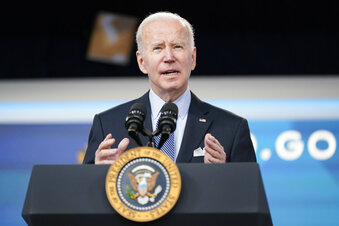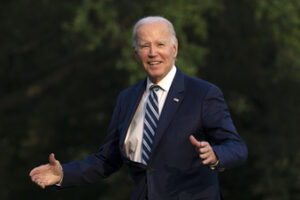Biden tapping oil reserve for 6 months to control gas prices
5 min read
President Joe Biden speaks about status of the country's fight against COVID-19 in the South Court Auditorium on the White House campus, Wednesday, March 30, 2022, in Washington. (AP Photo/Patrick Semansky)
WASHINGTON (AP) — President Joe Biden is ordering the release of 1 million barrels of oil per day from the nation’s strategic petroleum reserve for six months, the White House said Thursday, in a bid to control energy prices that have spiked after the U.S. and allies imposed steep sanctions on Russia over its invasion of Ukraine.
The White House said Biden is also calling on Congress to impose financial penalties on oil and gas companies that lease public lands but aren’t producing. And he intends to invoke the Defense Production Act to encourage the mining of critical minerals for batteries in electric vehicles, part of a broader push to shift toward cleaner energy sources and reduce the use of fossil fuels.
The actions demonstrate forcefully that oil remains a key vulnerability for the U.S. at home and abroad. Higher prices have hurt Biden’s approval domestically, while also adding billions of oil-export dollars to the Russian war chest as it wages war on Ukraine.
The release of reserves in the U.S. would create pressures that could reduce oil prices, though Biden has already twice ordered releases from the strategic reserves without causing a meaningful shift in oil markets.
Part of Biden’s concern is that high prices have not — so far — coaxed a meaningful jump in oil production. The planned release is a way to increase supplies as a bridge until oil companies ramp up their own production, with administration officials estimating that domestic production will grow by 1 million barrels daily this year and an additional 700,000 barrels daily in 2023.
The markets reacted quickly with crude oil prices dropping about 4% in Thursday trading to under $104 a barrel. Still, oil is up from roughly $60 a year ago, with supplies failing to keep up with demand as the world economy has begun to rebound from the coronavirus pandemic. That inflationary problem was compounded by Russian President Vladimir Putin’s invasion of Ukraine, which created new uncertainties about oil and natural gas supplies and led to retaliatory sanctions from the U.S. and its allies.
Biden has been in talks with allies and partners to join in additional releases of oil, such that the world market will get more than the 180 million barrels total being pledged by the U.S.
Americans on average use about 21 million barrels of oil daily, with about 40% of that devoted to gasoline, according to the U.S. Energy Information Administration. That total accounts for about a fifth of total global consumption of oil.
Domestic oil production is equal to more than half of U.S. usage, but high prices have not led companies to return to their pre-pandemic levels of output. The U.S. is producing on average 11.7 million barrels daily, down from 13 million barrels in early 2020.
Republican lawmakers have said the problem rests with the Biden administration being hostile to oil permits and the construction of new pipelines such as the Keystone XL. Democrats have countered that the country needs to move to renewable energy such as wind and solar that could reduce the dependence on fossil fuels and Putin’s leverage.
Sen. Steve Daines, R-Mt., blasted Biden’s action to tap the reserve without first taking steps to increase American energy production, calling its “a Band-Aid on a bullet wound.″
Daines called Biden’s actions “desperate moves″ that avoid what he called the real solution: ”investing in American energy production,″ especially oil and gas.
“Biden needs to stop appeasing the woke green activists and get oil and gas leases going again,” Daines said.
The Biden administration has countered that increasing oil output is a gradual process and the release would provide time to ramp up production. It also wants to incentivize greater production by putting fees on unused leases on government lands, something that would require congressional approval.
Oil producers have been more focused on meeting the needs of investors than consumers, according to a survey released last week by the Dallas Federal Reserve. About 59% of the executives surveyed said investor pressure to preserve “capital discipline” amid high prices was the reason they weren’t pumping more, while fewer than 10% blamed government regulation.
The steady release from the reserves would be a meaningful sum and come near to closing the domestic production gap relative to February 2020, before the coronavirus caused a steep decline in oil output.
Still, the politics of oil are complicated with industry advocates and environmentalists both criticizing the planned release. Industry advocates want to make drilling easier, while environmental groups say energy companies should be forced to pay a special tax on windfall profits instead.
The American Petroleum Institute, the oil and gas industry’s top lobbying group, said Biden needs to stop focusing on interim steps such as the strategic reserve.
“Instead of managing from crisis to crisis, we should be focused on promoting policies that avoid them altogether through increased production of our nation’s domestic energy resources,” said Frank Macchiarola, senior VP of policy, economics and regulatory affairs.
Jamie Henn, spokesperson for STOP (Stop the Oil Profiteering), said releasing more oil from the strategic reserve “won’t address the root cause of these high gas prices: Big Oil’s coordinated campaign to gouge Americans at the pump. A better solution would be to pass the windfall profits tax proposed in Congress which guarantees immediate relief to Americans without undermining the administration’s climate goals. Big Oil should pay for the problem they’ve created.”
The Biden administration in November announced the release of 50 million barrels from the strategic reserve in coordination with other countries. And after the Russia-Ukraine war began, the U.S. and 30 other countries agreed to an additional release of 60 million barrels from reserves, with half of the total coming from the U.S.
According to the Department of Energy, which manages it, more than 568 million barrels of oil were held in the reserve as of March 25. After the release, the government would begin to replenish the reserve once prices have sufficiently fallen.
News of the administration’s planning was first reported by Bloomberg.







